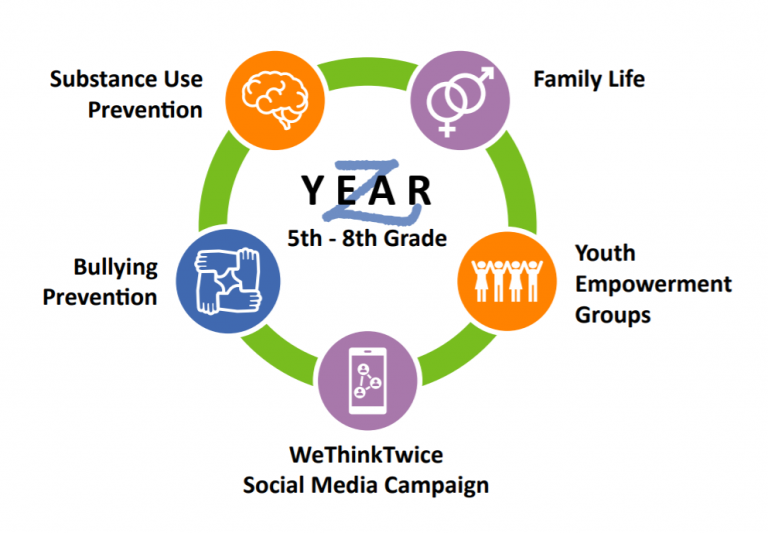Adolescent Health Initiative & YEAR Z
Adolescent Health Initiative

Through direct education programs, youth empowerment groups, and social media efforts, the Poe Center’s Adolescent Health Initiative (AHI) helps youth in North Carolina navigate the complex reality of growing up. We designed this initiative to provide youth skills to guide their decision making towards positive, healthy choices that ensure their social-emotional well-being in a way that works for each of them individually.
What else will YEAR Z include?

– Youth Empowerment Groups
– Social Media
– We Think Twice Campaign: Find answers to questions about sex, relationships, goals, and more. Sex, drinking, smoking, and using drugs can throw your goals off track. Find resources to help you “think twice,” resist negative peer pressure, and stand by your choices. Visit the We Think Twice website.
– Resources for educators, family, caregivers, and other adults in the community
– Referrals
– Using NCCARE360, students will be referred to health services and resources in their county. What is NCCARE360? Learn more.
To schedule, contact Dr. Thomas Ray, MA, NBCT, PhD.
How will Year Z Programs Work?

Being an adolescent is difficult, and students face a variety of challenges during this time of their lives. Poe health educators will help students identify and enhance coping tools (resiliency skills) to help them self-regulate and manage the stress, anxiety, and pressure of the adolescent years more effectively. These skills will help students to “bounce back” from difficult situations and have the confidence of being in control of their own responses. This holistic approach to health education is what makes YEAR Z unique and effective.
Following the pattern in the step graphic below, each grade level will receive 5 sessions, tailored with age-appropriate versions of the subject matter knowledge. These sessions will be linked throughout with the above-mentioned resiliency tools, to help students find a method of self-regulation that works best for them.
Right now, because of COVID-19, all sessions will be delivered virtually until schools allow visitors to return to the school building and it is considered safe to resume in-person education.
Why is this important?
By using that trauma-informed framework as a basis, Poe is creating a learning environment that allows students to understand and utilize tools to support themselves and others in regulating during times of stress. This program guides students’ social-emotional growth by engaging them with the information presented and ways to apply that knowledge to healthy decision-making in their daily lives.
Through these programs, we aim to help teachers meet the Mental and Emotional Health (MEH), Interpersonal Communication and Relationships (ICR) and Alcohol, Tobacco, and Other Drugs (ATOD) Healthful Living Essential Standards for grades 5, 6, 7, and 8. The content cuts across other content areas (e.g., Science, ELA).
Connect with AHI through #WeThinkTwice on social media
Follow the Poe Center on Instagram, Facebook, and Twitter for #WeThinkTwice posts. Along with programs, the Poe Center is sharing resources from #WeThinkTwice, a campaign to help youths think critically about their choices.
What does AHI look like in practice?
Poe’s Adolescent Health Initiative, supported with federal funding, works with North Carolina youth from 5th-8th grades to provide a series of direct education programs, called Youth Empowerment through Action and Resiliency for Generation Z (YEAR Z). YEAR Z is a series of five direct education sessions, covering topics like puberty and family life, healthy relationships, substance use prevention, and bullying prevention, delivered within a trauma-informed framework and built on a foundation of social-emotional growth and resiliency tools. The specifics covered under each topic umbrella will change slightly with the grade, to stay age-appropriate, but the general focal topics for each series will be as follows:
Session 1: Opening Session
– Intro, Resiliency Foundation/Background
Session 2
– Family Life
Session 3
– Substance Use Prevention
Session 4
– Bullying Prevention
Session 5: Closing Session
– Resiliency Wrap-up and Goal-setting



